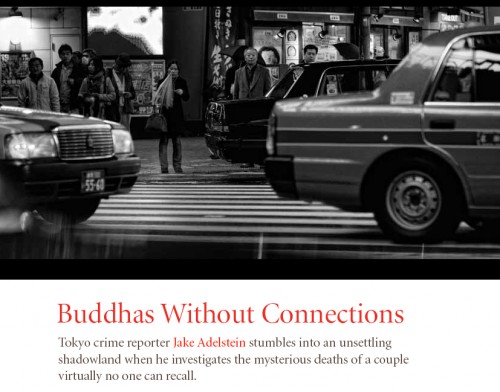On the 8th and 15th of this month, in Japan and in parts of Asia, they celebrate Nirvana Day. It commemorates the death of the Buddha and his liberation from the cycle of death and rebirth; pain and suffering. In Japan, the Buddha or a Buddha is often referred to as hotoke (仏). Over time, the word itself has almost become a synonym for the deceased or the spirits of the dead. Buddha originally meant “one who is awake.” In Japan, to distinguish between the use of hotoke as a reference to the departed and someone who is enlightened (achieved 悟り/satori), the word ikibotoke (生き仏) or “living buddha” is sometimes used. I’ve should mention I have never ever heard anyone use that in reference to myself. They do say it about the Dalai Lama.
Nirvana Day is celebrated in different ways and on different days both inside and outside of Japan, depending on the Buddhist sect and sometimes even the individual temple. For some, it’s a time to remember the recently departed (仏様・hotokesama) and to reflect on mortality. In some countries and at some temples, it’s a celebration of life and people gather together for small parties. In Buddhist metaphysics, it’s very hard to be born as a human–it’s chance that we don’t often get and simply to be alive as a human being and not a hungry ghost or demon or vermin is considered a cause for rejoicing. (I’m guessing that if you’re born as a rat it’s hard to store up enough good karma points to come back as a human. I’m not sure about monkeys or Henry Kissinger.)
This piece was originally written with TOKYO VICE in mind but I took it out of the final draft. Last year, the Buddhist/Meditation/Culture Magazine Shambhala Sunasked me if I was interested in submitting a piece and I pulled this out, rewrote it, checked my notes and sent it to them. Almost a year went by and before publication, I revised it once more. 2010 was a long hard year for me. I lost two good friends. One killed himself or was killed by his own people. He was a yakuza so that’s part of the trade, I suppose. The other was my lawyer and mentor, Igari Toshiro, who I strongly suspect was murdered and the job set up to look like a suicide. 仏 (hotoke) literally “a buddha” is a word that the police use a lot. Homicide detectives are fond of the word. 「ホシを捕まえないと、仏が浮かばれない/hoshi o tsukamaenai to, hotoke ga ukabarenai」. Loosely translated, “If we don’t catch the killer, the spirt of the dead will never rest.” It comes from a folk belief that those wrongfully killed are reluctant to leave the world until justice is done and roam the earth as hungry ghosts.In the case of Igari-san, I doubt that the people responsible will ever be brought to justice, at least in this life. Well, maybe there is karma in the universe and it’ll catch up with them in the next. I’d like to believe that but I’m not one for blind faith.
Despite writing about death, crime, betrayal, human depravity, and dealing with the aftermath a great deal, I’m not a morbid person; most of the time I’m pretty cheerful. However, I think that remembering our mortality is an important part of enjoying life.
My father is now close to 73. He’s been a county coroner for over two decades and yet he’s one of the happiest people I know. I asked him if the job ever gets him down and he says, “Of course, it does. But at the end of the day, sometimes, it makes me realize how lucky I am not to be the guy on the morgue table. Life is a precious thing and easily lost. When you know that, you treasure every moment and you really live. It gives you a greater perspective on things and what really matters and what doesn’t. Almost very suicide that comes in is a tragedy and so is every homicide. Almost any life lost is a tragedy. Because death is the one mistake you cannot undo. ”
Thanks to the Shambahla Sun for publishing the article and for giving me permission to post it on the blog. The names of the deceased in the article have been slightly changed out of respect for any relatives or friends that they might have had. Click on the picture or the link below to read the full article.

[…] This post was mentioned on Twitter by mike smith, Giada Castriotta, Jake Adelstein, Jake Adelstein, JSRC and others. JSRC said: New: 無縁仏(Muenbotoke): Buddhas Without Connections http://tinyurl.com/4u9fhn6 […]
This is a fantastic read… Maybe I noticed it more because of the population density, or the maybe it was the rain, or all the exhausted salarymen sleeping on the trains, but I always felt Japan was burdened with loneliness. 無縁仏 captures this sentiment perfectly… Do you have any more excerpts that didn’t make it into the book? I would love to read them.
Thanks!
If loneliness were a disease, this country has an epidemic. Japan has a culture where having close friends is difficult and admitting to any sort of mental illness or addiction is detrimental and career damaging. I’m glad that the piece captured some of that sentiment. There are many things that never made the final cut of the book. Someday, but probably not in the near future, maybe Tokyo Vice will be reissued and updated with everything included. Or maybe, I’ll add the chapters as an appendix.
Right now, I’m focussing on the second book. Thanks for writing in!
Thank you for this. I really appreciate your posting. And I really like the words of wisdom your father shared. A deep bow to him.